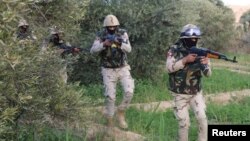Following a terrorist attack Saturday on Egyptian military personnel in the northern Sinai region of el-Arish that resulted in 15 casualties, Egyptian President Abdel-Fattah el-Sissi told a security gathering in Munich that terrorism destroys societies and hinders economic development, and it must be fought by all.
Arab media said the attack took place at a military checkpoint not far from the town of Sheikh Zuweid, the scene of previous terrorist attacks.
Egyptian army spokesman Tamer el-Refai wrote on his Facebook page that "14 soldiers and an officer were killed or wounded," adding that the army responded by killing seven Islamic militants. The attack reportedly took place about dawn.
IS claim
The Islamic State group claimed responsibility for the attack through its AMAQ news agency, though the group offered no proof for its claim.
Several Arab news channels reported that terrorists with ties to IS were behind the Sinai attack.
Egypt launched a major military campaign against terrorism in the northern Sinai more than a year ago, and there has been a noticeable drop in the level of terrorist attacks in that area, although the region remains restive. The Egyptian military has created a buffer zone with nearby Gaza, in addition to destroying numerous tunnels from Gaza into the Sinai.
The BBC Arabic service reported the Egyptian military also cleared a buffer zone around el-Arish airport after a failed terrorist attack on a plane carrying the country's defense minister and army chief. It did not say when the alleged attempted attack took place. VOA could not independently confirm the story.
El-Sissi said at the Munich Security Conference that terrorism was a burden for many countries in the region and that all nations should join forces to combat it.
He said terrorism had become an ugly international phenomenon that destabilizes countries, and that it was the duty of all nations to help to uproot it, since it is a major threat to economic development. He urged the international community to combat groups that practice terrorism and countries that support those groups.
Libya's eastern military spokesman, Col. Ahmed Almasmari, indicated in an interview Saturday that his forces also were fighting terrorist groups being sponsored by outside countries.
He said the Libyan army, under eastern military commander Gen. Khalifa Hafter, was working to wipe out terrorism and foreign mercenaries that fuel it.
Almasmari said that his forces had "dismantled a terrorist axis supported by both Qatar and Turkey." Both countries deny they support terrorism.
Local, regional causes
Khattar Abou Diab, who teaches political science at the University of Paris, told VOA that terrorism has both local and regional causes.
He said terrorism increased in Egypt after the Muslim Brotherhood was ousted in 2013, as was the case in Algeria when the Islamists were overthrown in 1992, causing a bloody 10-year reign of terrorism. He said outside countries also support terrorists in Egypt, but that the Egyptian government has traditionally had bad relations with the Bedouin tribes in the northern Sinai, which makes the region a fertile ground for unrest.
Abou Diab speculated the current campaign to crush IS in Syria and Iraq "may be causing some terrorists to flee to other places, like the Sinai."







